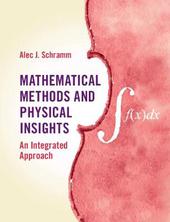
|
Mathematical Methods and Physical Insights: An Integrated Approach
Hardback
Main Details
| Title |
Mathematical Methods and Physical Insights: An Integrated Approach
|
| Authors and Contributors |
By (author) Alec J. Schramm
|
| Physical Properties |
| Format:Hardback | | Pages:786 | | Dimensions(mm): Height 253,Width 193 |
|
| Category/Genre | Maths for scientists
Applied physics |
|---|
| ISBN/Barcode |
9781107156418
|
| Classifications | Dewey:530.15 |
|---|
| Audience | |
|---|
|
Publishing Details |
| Publisher |
Cambridge University Press
|
| Imprint |
Cambridge University Press
|
| Publication Date |
16 June 2022 |
| Publication Country |
United Kingdom
|
Description
Mathematics instruction is often more effective when presented in a physical context. Schramm uses this insight to help develop students' physical intuition as he guides them through the mathematical methods required to study upper-level physics. Based on the undergraduate Math Methods course he has taught for many years at Occidental College, the text encourages a symbiosis through which the physics illuminates the math, which in turn informs the physics. Appropriate for both classroom and self-study use, the text begins with a review of useful techniques to ensure students are comfortable with prerequisite material. It then moves on to cover vector fields, analytic functions, linear algebra, function spaces, and differential equations. Written in an informal and engaging style, it also includes short supplementary digressions ('By the Ways') as optional boxes showcasing directions in which the math or physics may be explored further. Extensive problems are included throughout, many taking advantage of Mathematica, to test and deepen comprehension.
Author Biography
Alec J. Schramm is a professor of physics at Occidental College, Los Angeles. In addition to conducting research in nuclear physics, mathematical physics, and particle phenomenology, he teaches at all levels of the undergraduate curriculum, from courses for non-majors through general relativity and relativistic quantum mechanics. After completing his Ph.D., he lectured at Duke University and was a KITP Scholar at the Kavli Institute for Theoretical Physics at UC Santa Barbara. He is regularly nominated for awards for his physics teaching and clear exposition of complex concepts.
Reviews'Schramm's Mathematical Methods and Physical Insights is a very welcome new textbook in the area of pedagogical mathematical physics. The book contains numerous insightful and helpful examples from classical and modern physics, as well as unusual and interesting applications of the presented mathematical concepts within and beyond physics. I find the 'BTW' inserts, and the lively, unpretentious style of the book both exciting and entertaining. The material discussed in Schramm's textbook covers entirely the scope of our three-trimester-long Mathematical Methods offering, and additionally provides useful background material to 'even out' the often inhomogeneous preparation of students in these classes; I will definitely consider adopting this textbook for my next offerings of Mathematical Methods for Physics here at the University of California, Santa Cruz.' Professor Stefano Profumo, University of California, Santa Cruz 'As the title suggests, Schramm's book distinguishes itself from traditional mathematical methods texts in its thematic approach that builds from unit to unit, using rich examples from physical systems that elucidate each topic. A must-read for physicists wanting to expand their mathematical toolkit as well as for mathematicians hoping to gain new insights from the physical world.' Professor Jason Detwiler, University of Washington 'For students taking physics courses, one of the difficulties is how to apply appropriate mathematical skills in problem solving (e.g., using integration to find the electric field produced by a continuous charge distribution). This book introduces commonly used mathematical skills from the perspective of a physicist. Focusing on the topics in upper-level physics courses, it provides the mathematical skills for solving problems in each topic. The book is easy to read, and the problems at the end of each chapter offer plenty of exercises for students. The book is a valuable resource for undergraduate students taking upper-level physics courses, and instructors teaching such courses. It could also be a useful reference for graduate students.' Professor Hong Lin, Bates College 'Physics and engineering students often struggle with mathematics texts that present the material in an abstract fashion, disconnected from practical applications. Schramm's text represents a refreshing and much needed change. Providing context and intuition throughout, with many worked examples, and in engaging prose, it does more than just explain mathematical methods; it infuses them with meaning and relevance.' Dr. Jochen Rau, RheinMain University of Applied Sciences, Germany
|